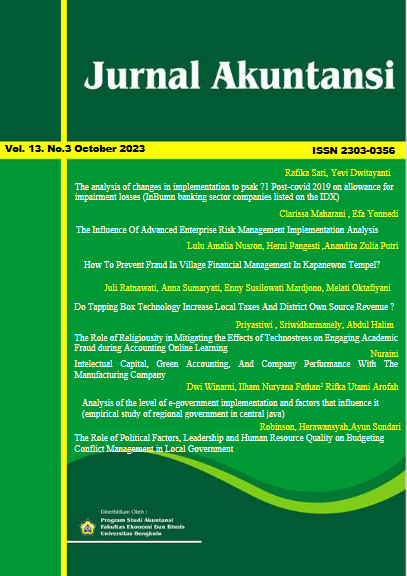Main Article Content
Abstract
Changes in the Statement of Financial Accounting Standards from PSAK 55 to PSAK 71 require banks to use the Expected Credit Loss (ECL) method for the establishment of Allowance for Impairment Losses (CKPN). In the ECL method, banks establish CKPN from the beginning of credit recognition using the forward-looking method on macroeconomic conditions. In Indonesia's current status quo in facing the Covid-19 pandemic, the existence of PSAK has begun to be tested, adjustments must be made to financial accounting standards that are useful for strengthening the line of corporate accountability in Indonesia and able to answer Indonesia's main urgency at this time. The purpose of this paper is to produce a framework that can later become an alternative bank in making decisions for the application of the post model PSAK 71. The method in this study uses a qualitative method with a descriptive design. The consequence of applying PSAK 71 will result in a rise in CKPN on loans, which will have an impact on the company's capital. Because the method used in PSAK No. 71 will use the expected credit loss method to determine the expected credit loss, loans that were not previously formed by CKPN will be formed depending on whether there is credit risk exposure or not, as shown by BBNI and BBTN which are seen in the observation year. This will result in an increase in the amount of CKPN on loans.Since there were banks in BUMN banking that experienced an increase in CKPN on loans as indicated by BBNI and BBTN, but there were also banks that experienced a decrease in the value of CKPN on loans as indicated by BBRI, there is no clear correlation between the application of PSAK 71 and CKPN on credit.
Article Details
Copyright (c) 2023 rafika apik

This work is licensed under a Creative Commons Attribution-ShareAlike 4.0 International License.
Author retains the copyright and grants the journal the right of first publication of the work simultaneously licensed under the Creative Commons Attribution-ShareAlike 4.0 License that allows others to share the work with an acknowledgement of the work's authorship and initial publication in this journal
Author is able to enter into separate, additional contractual arrangements for the non-exclusive distribution of the journal's published version of the work (e.g., post it to an institutional repository or publish it in a book) with the acknowledgement of its initial publication in this journal.
Author is permitted and encouraged to post his/her work online (e.g., in institutional repositories or on their website) prior to and during the submission process, as it can lead to productive exchanges, as well as earlier and greater citation of the published work (See The Effect of Open Access).
Creative Commons Attribution-ShareAlike (CC BY-SA)
Jurnal Akuntansi is licensed under a Creative Commons Attribution-ShareAlike 4.0 International License.

